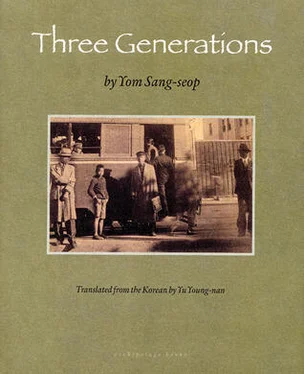Word was sent to a furniture store for a three-tiered chest of red sandalwood, a wardrobe with a glittering full-length mirror, another in which to keep bedding — though no bedding had been prepared yet — a display for ceramic wares, a chamber-pot rest, another full-length mirror, a decorative day mattress with a long, squat armrest; there seemed to be no end.
A cabinet and a rice chest were brought to the kitchen annex, and the center veranda was to be furnished like a Western-style reception room. To the brassware store, to the porcelain store, to the fabric store Choe was sent. She seemed to expect that Sang-hun would sell his rice paddy to pay for all these items. The commotion continued for several days, not unlike a house on the eve of a wedding. In a fit of anger, Sang-hun’s wife had removed all the pots from their cradles on the stove and had whisked them away with her. New pots were being fitted in the kitchen, while seamstresses, brought in from several households, were seated together making new bedding. Won-sam’s friends stood outside the gate and whispered among themselves whenever new furnishings were taken in, for they didn’t see a penny being spent in their shops.
“How long will she last here?”
“Who does she think she is? Does she think her luck will last, hauling in such a load on the same day the legal wife was kicked out?”
“If I had a pretty daughter, I’d become a queen’s father.”
“I’ll send my Eon-nyeon to a gisaeng house when the girl turns twelve.”
“Then?”
“After five years, she’ll become the youngest concubine of some important master.”
“Sure, dream on.”
Standing in the sun cracking jokes, they seemed to have forgotten how hungry they were.
“I don’t need to listen to your story. When you get rich, I’m gonna get a high-interest loan and buy you a couple drinks. So why don’t you borrow some money now and buy me one?”
“Sounds good. But how about you borrow money and buy me one of those drinks of yours first? We can toast to what’s just around the corner anyway, right?”
“What was I thinking? We should hurry up and give birth to Eon-nyeon first.”
They burst out laughing — jokes were their trusted friends.
Five or six days after moving in, Maedang assembled the bills and gave them to Sang-hun. Without even looking at them, Sang-hun told Clerk Choe to take them to Deok-gi.
Leafing through them, Deok-gi shook his head when his eyes settled on the grand total, more than fourteen hundred won.
“After the funeral expenses, there was over four thousand won in the bankbook my father took a while ago. What did he do with all that money and what does he expect me to do with these bills?” His father, who hadn’t touched the land deeds, had taken the bank records with him after the will was read.
“One bag of rice fetches only fourteen won these days. I would need to sell a hundred bags to come up with this amount.” Deok-gi muttered to himself as he folded up the bills and pushed them toward Choe.
“Well, I can’t help you here, but your father asked me to bring them over, so I guess you’ll do what’s right.”
Deok-gi sat quietly for a moment before placing the bills in a drawer.
The next day, Deok-gi went to Hwagae-dong.
Boisterous voices were drifting from the main room, knives clacked against chopping boards in a corner of the veranda, and meal trays were being piled in another corner. A festive house, it seemed. Everything looked so new that Deok-gi thought he must have come to the wrong house. Catching sight of a long white row of women’s shoes lined up below the veranda, he hesitated. The women preparing food eyed the unfamiliar young man before the main room was informed that a visitor had arrived. The hubbub quieted briefly before Clerk Choe looked out.
“Come in. Your father is here.”
The group of women in the main room leapt up as if someone had barked out an order. Deok-gi’s face burned when the constellation of young women’s eyes twinkled at him. He could discern neither their faces nor their outfits, but as they filed out to the veranda, they looked like gisaeng going home after a voice lesson.
What kind of a party are they throwing? A house-warming party?
Deok-gi was greeted by the Suwon woman clad in a white mourning dress, who rose along with his father’s concubine. The well-fed, imposing woman seated beside them had to be Maedang. His father, sitting on the new day mattress in the warmest part of the room, seemed to shrink sheepishly.
Clerk Choe was planted near the door, while Chang-hun was nowhere to be seen.
“Did you sleep here last night?” Deok-gi asked the Suwon woman.
“Yes. So, what do you think? Quite a different place with all this grandeur, isn’t it?” said the Suwon woman mischievously, looking around the room.
Deok-gi was silent.
What astonished Deok-gi most were the reflected faces in the mirrors everywhere he turned. Even his own face jumped out at him through a bright array of women’s overcoats, hats, and scarves hanging on the wall. The mirrors opposite each other reflected the objects in the room several times over. This mirror chamber must have been Maedang’s idea, and he couldn’t help but wince at her taste. The room was incomprehensibly stifling.
“Son, did you take a look at what I sent you yesterday?” Deok-gi didn’t respond. “If you can’t pay, just leave the bills here.” Sang-hun wasn’t in any mood to fight over bills in the presence of the gaggle of young ladies.
“It’s not that I don’t mean to pay them, but. ” Deok-gi’s heart was pounding with rage so it was almost impossible to go on. “Isn’t all this a little extravagant, considering our situation? Wouldn’t it have been enough if you had simply brought the furniture from the other house?”
Deok-gi felt it was utterly wasteful to shell out more than a thousand won merely to decorate the main room. It would be no easy feat to come up with the money to pay for it.
“What situation are you talking about? If you are going to speak with such arrogance, just leave the bills here and get out. As for the things that are lying around in the other house, you can use them yourself.”
“If you stop and think of how you used to oppose my grandfather’s spending on the ancestors’ graves. ”
“Who asked you to support me? This is disgusting — are you my supervisor? Send me the rice-refinery ledger today.” Sang-hun was intentionally unpleasant.
“If you told me to hand over other things, not just the refinery, I’d do so willingly. But if you keep spending money like water, how can I hand the reins to you?”
“I’m claiming what is mine, whether you agree to it or not.”
“Will it disappear if you let me take care of it?”
“You talk like a thief. You’re saying you can’t pay a thousand won, aren’t you?”
Writhing with rage, the father approached his son and was about slap him on the face, but Deok-gi stood up and his father’s palm struck his shoulder. Deok-gi wasn’t sure whether his father was sick or going senile, but he quickly went out to the veranda, thinking that he shouldn’t fan his father’s agitation. His affection for his father was draining away; he now felt as if they came from different worlds. Deok-gi’s heart went out to him, though, understanding that a person who loses his faith often will lead a chaotic life after his ambitions and hopes are dashed. On the other hand, without faith, his father was free to be himself and break loose from the constraints that had been imposed on him. But how could he have fallen so far, so late in life? Instead of feeling antagonism toward his father, Deok-gi merely felt sad.
When he returned home, Deok-gi wrote a dozen checks and gave them to Secretary Ji with the bills from the stores.
Читать дальше












